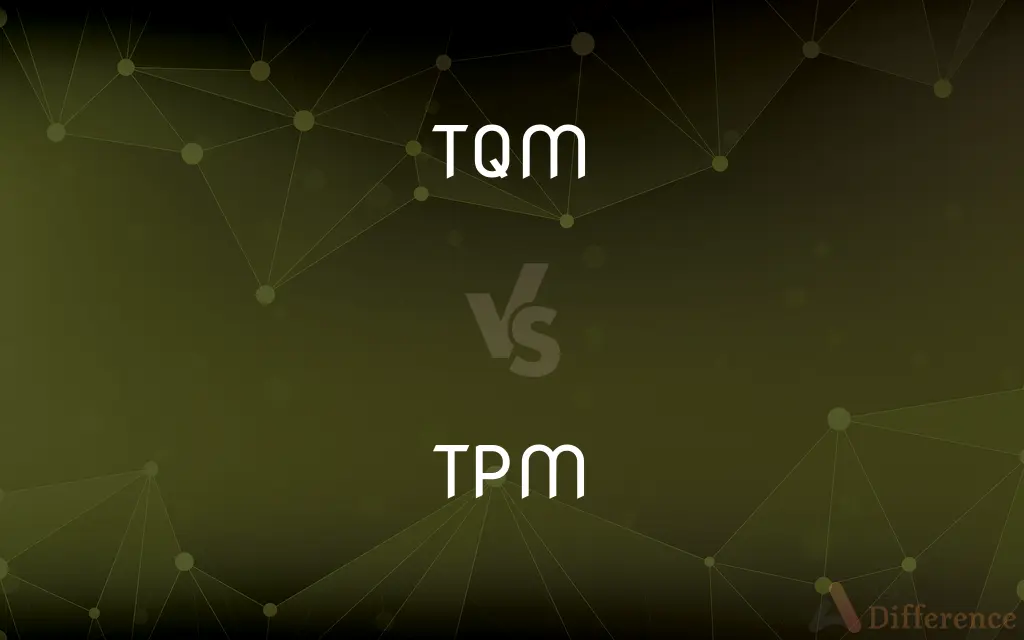TQM vs. TPM — What's the Difference?
By Tayyaba Rehman — Published on December 26, 2023
TQM (Total Quality Management) focuses on continuous improvement in all aspects of an organization, while TPM (Total Productive Maintenance) emphasizes proactive maintenance to maximize equipment efficiency.

Difference Between TQM and TPM
Table of Contents
ADVERTISEMENT
Key Differences
TQM, or Total Quality Management, is a comprehensive management approach aiming to improve the quality of products and services through continuous processes. In contrast, TPM, or Total Productive Maintenance, seeks to enhance production efficiency by emphasizing the importance of equipment maintenance and minimizing breakdowns.
While TQM adopts a broad perspective that focuses on overall organizational improvements by involving everyone in the organization, TPM specifically targets the manufacturing sector and places a premium on machine maintenance and reliability.
TQM believes in enhancing customer satisfaction by producing quality products and services, incorporating feedback loops, and using data-driven decision-making. Conversely, TPM is geared towards minimizing equipment downtime, reducing defects resulting from equipment malfunctions, and promoting employee participation in routine maintenance.
Organizations employing TQM principles integrate a culture of quality across all departments and processes. TPM, on the other hand, instills a culture of equipment ownership among operators, encouraging them to take responsibility for the equipment's upkeep and optimal functioning.
To summarize, while TQM and TPM both aim for operational excellence, TQM is more encompassing, focusing on total quality improvement across an organization, whereas TPM zeroes in on maximizing production efficiency through proactive equipment maintenance.
ADVERTISEMENT
Comparison Chart
Focus
Continuous improvement in overall quality
Maximizing equipment efficiency and reliability
Applicability
Across all departments
Primarily in the manufacturing sector
Key Goal
Enhance customer satisfaction
Minimize equipment downtime and defects
Involvement
Everyone in the organization
Equipment operators and maintenance teams
Cultural Aspect
Integrating a culture of quality
Instilling a culture of equipment ownership and care
Compare with Definitions
TQM
Focuses on customer satisfaction and feedback.
TQM methodologies helped the firm better understand customer needs.
TPM
Aims to promote equipment reliability and ownership.
With TPM in place, every operator took pride in their machine's performance.
TQM
An approach emphasizing continuous quality improvement.
Using TQM principles, the company revamped its production process.
TPM
A strategy emphasizing proactive equipment maintenance.
The factory adopted TPM to reduce unexpected machine breakdowns.
TQM
Involves everyone in the organization.
Incorporating TQM means every employee plays a role in quality assurance.
TPM
Focuses on maximizing production efficiency.
Through TPM, the manufacturing unit saw higher output rates.
TQM
A holistic strategy for overall organizational excellence.
By adopting TQM, the business aims for excellence in every facet.
TPM
Involves equipment operators in maintenance.
TPM encouraged operators to routinely check and service their machines.
TQM
Data-driven decision-making process.
With TQM, the company made choices based on detailed analytics.
TPM
Targets minimizing equipment-related defects.
After implementing TPM, product defects due to machinery dropped significantly.
Common Curiosities
How is TPM different from TQM?
TPM emphasizes proactive equipment maintenance, while TQM focuses on overall continuous quality improvement.
Is TPM primarily for the manufacturing sector?
Yes, TPM mainly targets the manufacturing sector, emphasizing equipment efficiency.
What is a primary goal of TPM?
A primary goal of TPM is to minimize equipment downtime and defects.
How does TQM improve customer satisfaction?
TQM emphasizes producing quality products, incorporating feedback, and data-driven decisions to enhance customer satisfaction.
What does TQM stand for?
TQM stands for Total Quality Management.
Can TQM principles be applied outside of manufacturing?
Yes, TQM principles can be applied across various sectors, not just manufacturing.
Is data a significant component of TQM?
Yes, data-driven decision-making is a key component of TQM.
Does TQM involve only management or all employees?
TQM involves everyone in the organization, not just management.
How does TPM affect production efficiency?
TPM aims to maximize production efficiency by reducing equipment-related issues and downtime.
Which strategy is more comprehensive: TQM or TPM?
TQM is more comprehensive, focusing on overall organizational quality improvement.
Are there certifications available for TQM and TPM?
Yes, there are various certifications available for organizations and individuals in both TQM and TPM.
Can TPM principles be extended beyond equipment?
While TPM's primary focus is equipment, its principles of proactive care and ownership can be extended to other areas.
What cultural change does TPM bring?
TPM instills a culture of equipment ownership and proactive maintenance among operators.
How does TQM handle feedback?
TQM integrates feedback loops to continuously refine processes and products based on customer and stakeholder inputs.
Which approach is better for my manufacturing unit: TQM or TPM?
Both have their merits. The choice depends on whether you prioritize overall quality improvement (TQM) or equipment efficiency and reliability (TPM). Often, a combination of both can be beneficial.
Share Your Discovery

Previous Comparison
F-15 vs. FA-18
Next Comparison
UPI vs. Internet BankingAuthor Spotlight
Written by
Tayyaba RehmanTayyaba Rehman is a distinguished writer, currently serving as a primary contributor to askdifference.com. As a researcher in semantics and etymology, Tayyaba's passion for the complexity of languages and their distinctions has found a perfect home on the platform. Tayyaba delves into the intricacies of language, distinguishing between commonly confused words and phrases, thereby providing clarity for readers worldwide.
















































